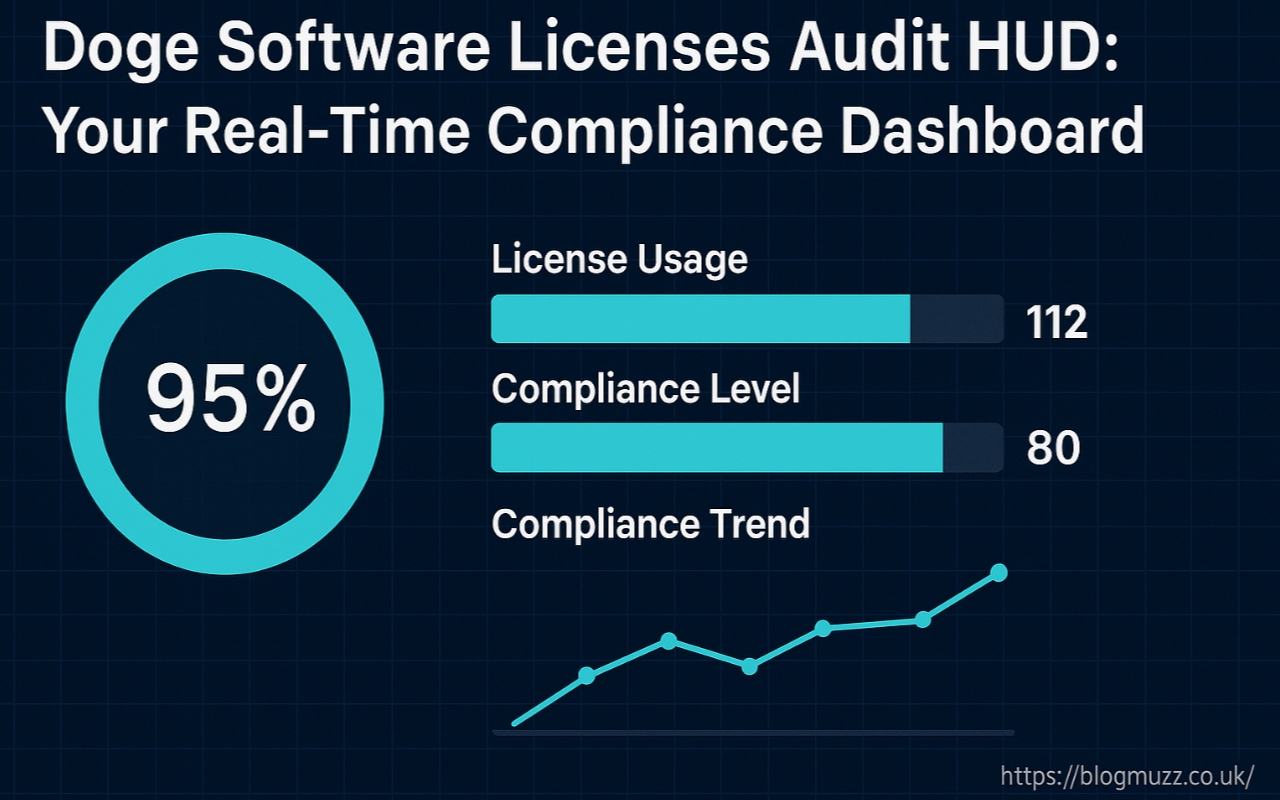Introduction to Doge Software Licenses Audit HUD
In the modern digital ecosystem, software development rarely happens in isolation. Organizations increasingly rely on a mixture of proprietary software, open-source tools, and third-party libraries to build scalable and efficient systems. With this reliance comes the challenge of managing software licenses effectively. One solution that has gained attention is the Doge Software Licenses Audit HUD, a specialized real-time compliance dashboard designed to streamline license auditing and ensure transparency across development pipelines. This tool is not just another monitoring system; it represents a shift in how organizations approach license governance. By integrating visualization with automation, it enables businesses to stay ahead of compliance risks, legal complications, and security vulnerabilities that arise from improper license management.
Why Software License Auditing Matters Today
Software license auditing has become a critical process for businesses in virtually every industry. Each piece of software, whether purchased, downloaded, or open-sourced, comes with terms that dictate how it can be used. Violating these terms—whether knowingly or accidentally—can result in severe consequences, from financial penalties to reputational damage. For organizations using hundreds of open-source packages and frameworks, manually keeping track of these licenses is not practical. This is where platforms like Doge Software Licenses Audit HUD become indispensable. They offer automated license discovery, real-time alerts, and reporting features that help enterprises ensure every tool they use aligns with compliance requirements. In an era where open-source is embedded into nearly every product, staying compliant is not optional—it is essential for long-term growth.
Understanding the Concept of a HUD for License Auditing
A heads-up display (HUD) is typically associated with aviation or gaming, where it provides a real-time overlay of critical information. Applied to software auditing, a HUD for licenses presents compliance data in an easy-to-read, visual format. Instead of burying compliance officers and developers in spreadsheets and static reports, the Doge Software Licenses Audit HUD centralizes critical license data into a single interactive interface. This approach ensures that decision-makers can instantly view compliance statuses, identify potential violations, and take corrective action before risks escalate. By translating license data into an intuitive dashboard, the HUD empowers both technical and non-technical users to understand the organization’s compliance health without extensive legal training.
Core Features of Doge Software Licenses Audit HUD
The strength of the Doge Software Licenses Audit HUD lies in its unique features designed to meet the dynamic needs of enterprises. First, it provides real-time license detection, scanning code repositories and software dependencies to classify and log license types. Second, it offers compliance scoring, where each project receives a score based on its adherence to licensing standards, making it easy to prioritize remediation efforts. Third, the HUD comes equipped with visual heatmaps and color-coded alerts that flag high-risk licenses, such as those that enforce copyleft restrictions. Additional features include exportable compliance reports, integration with CI/CD pipelines, and role-based access control to ensure security. Together, these functionalities make the Doge Software Licenses Audit HUD more than a simple audit tool; it is an ongoing compliance companion for modern software teams.
Benefits of Using Doge Software Licenses Audit HUD
Adopting the Doge Software Licenses Audit HUD delivers multiple advantages to organizations of varying sizes. For one, it reduces the risk of costly non-compliance penalties by ensuring licenses are correctly adhered to across all projects. It also boosts development efficiency by integrating seamlessly into the existing DevOps pipeline, so developers receive license feedback during the coding process rather than after release. Another benefit is legal assurance—compliance teams gain confidence that all licensing terms are being followed, reducing the risk of lawsuits or disputes. The dashboard also promotes cross-departmental collaboration, since managers, legal advisors, and engineers can all access the same visual data. In essence, the Doge Software Licenses Audit HUD not only safeguards organizations from legal troubles but also enhances their ability to deliver products faster and with greater confidence.
How Doge Software Licenses Audit HUD Supports Open-Source Compliance
Open-source software has revolutionized development, but it has also introduced a new layer of complexity in compliance management. Each open-source project comes with unique licensing terms, ranging from permissive licenses like MIT to restrictive ones like GPL. The Doge Software Licenses Audit HUD plays a pivotal role in navigating this complexity. By automatically identifying the type of license associated with each component, it prevents organizations from unintentionally violating license obligations such as attribution requirements or restrictions on commercial use. The HUD also maintains an updated repository of license definitions, ensuring that companies are informed about evolving legal interpretations. This proactive monitoring reduces the likelihood of compliance gaps that often arise when open-source code is adopted without thorough legal review.
Integration with Enterprise Systems and DevOps Pipelines
One of the defining strengths of the Doge Software Licenses Audit HUD is its ability to integrate with enterprise systems and DevOps pipelines. It can be embedded into tools like Jenkins, GitLab, or GitHub Actions, ensuring that license auditing becomes a natural part of the continuous integration/continuous deployment (CI/CD) process. Instead of conducting audits only at the end of a development cycle, organizations can receive real-time feedback on license compliance during every stage of development. This not only saves time but also reduces rework costs by identifying compliance issues early. The HUD also supports integration with enterprise resource planning (ERP) and governance, risk, and compliance (GRC) systems, providing executives with a consolidated view of both financial and legal compliance. Such seamless integration transforms auditing from a reactive activity into a proactive strategy.
Challenges Addressed by Doge Software Licenses Audit HUD
Organizations often face significant challenges in managing software licenses, including complexity, scale, and evolving regulations. The Doge Software Licenses Audit HUD addresses these challenges head-on. For example, in large organizations where hundreds of teams use thousands of dependencies, manual auditing becomes nearly impossible. The HUD automates this process, ensuring that every license is logged and categorized accurately. Another challenge is the lack of visibility—many teams are unaware of the licenses attached to the libraries they use. The HUD solves this by making all license data visible in a centralized dashboard. Furthermore, it helps organizations adapt to evolving compliance standards, as software licensing laws and interpretations continue to change globally. By addressing these challenges, the Doge Software Licenses Audit HUD provides organizations with peace of mind and operational resilience.
Real-World Applications and Case Studies
The practical applications of the Doge Software Licenses Audit HUD are evident across industries. For instance, a fintech company using open-source encryption libraries can use the HUD to ensure they comply with export restrictions and licensing conditions. A government agency developing citizen service portals can integrate the HUD to maintain transparency and avoid the misuse of third-party code. Even startups benefit by using the HUD to streamline compliance from the outset, reducing risks when they scale or seek funding. Case studies have shown that organizations using tools like the Doge Software Licenses Audit HUD not only reduce compliance costs but also improve collaboration between legal and technical teams. By serving as a bridge between developers and compliance officers, the HUD ensures that innovation and governance go hand in hand.
Future of License Auditing with Doge Software Licenses Audit HUD
As the digital landscape evolves, so too will the importance of automated license auditing. The future of the Doge Software Licenses Audit HUD lies in enhanced AI-driven analytics, predictive compliance monitoring, and tighter integration with blockchain technology for immutable license tracking. Future versions may also feature machine learning algorithms capable of predicting compliance risks before they arise, based on historical patterns of code usage. As global regulations around software licensing continue to evolve, tools like the Doge Software Licenses Audit HUD will play a critical role in enabling businesses to adapt quickly. Far from being a static solution, the HUD represents a continuously evolving approach to compliance, one that ensures organizations remain agile, compliant, and future-ready.
Conclusion: Why Doge Software Licenses Audit HUD Matters
In conclusion, the Doge Software Licenses Audit HUD is more than just a dashboard—it is a transformative tool for modern organizations navigating the complexities of software licensing. By combining real-time insights, automation, and visual clarity, it empowers businesses to manage compliance proactively rather than reactively. The risks of ignoring license compliance are too great in today’s interconnected world, where open-source and proprietary tools form the backbone of innovation. The HUD not only protects organizations from financial and legal repercussions but also supports smoother workflows, stronger collaboration, and greater confidence in the products being delivered. For any organization serious about long-term digital success, adopting the Doge Software Licenses Audit HUD is not just an option—it is a necessity.



